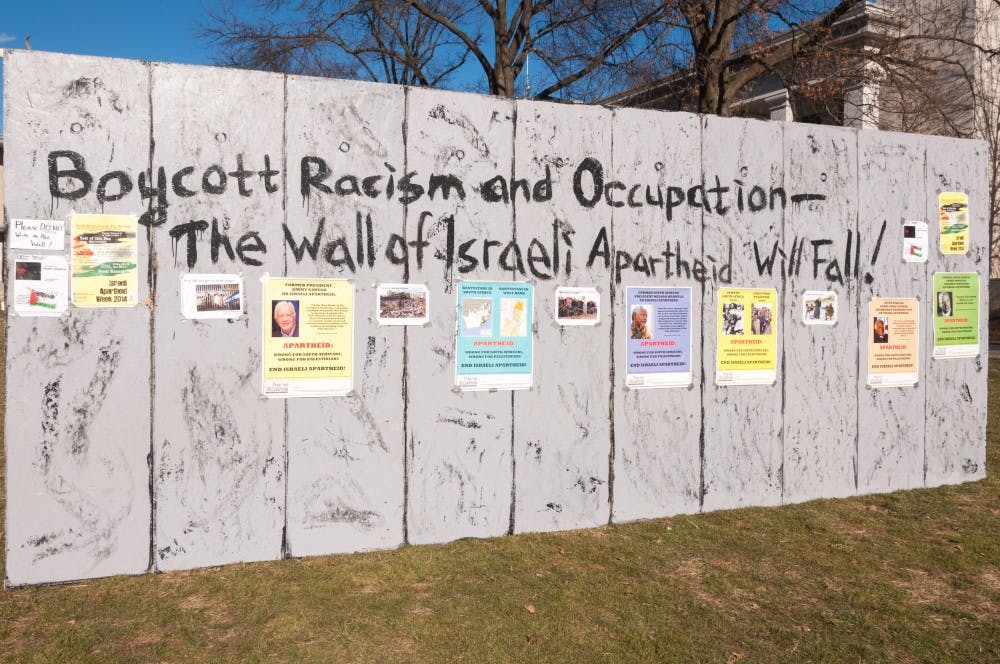This morning I woke up with a strange feeling. As a senior at AU, I’ve mustered up quite a frustration toward the Kay Spiritual Center. For some reason, I decided that today would be the day I march right up to Kay and let the chaplain know how I feel. But to my sincere disappointment, I encountered an obstacle in my way. As you may have noticed on your walk to class, the Students for Justice in Palestine (SJP) group has built an apartheid wall. This wall, meant to bring awareness of the Israeli apartheid regime hampered my rage-filled quest. As I stood in front of the wall, I looked for a way to climb over. I was unsuccessful. Next, I thought maybe I would just bust straight through it. Again, I was unsuccessful. Disappointed with myself, I turned around and went in to the library to start studying for midterms (probably a better use of my time).
As I sat in the library I started thinking about the purpose of this separation barrier set up by Israel. There are many myths surrounding it, which need to be debunked. The barrier was created as a response to terrorism during the second intifada in the early 2000s. The barrier, which upon completion will consist of 5 percent concrete-wall material, has been operational since 2003 under the leadership of former Israeli Prime Minister Ariel Sharon. Since the implementation of the barrier, mortality as a result of terrorism from Palestinian extremists has been reduced by 90 percent. While 451 Israelis were killed in 2002 by radical terrorists, that number went down to 45 in 2005. Since 2005, that number has decreased again. Suddenly, I realized that the wall on campus did exactly what the barrier does along the 1949 Armistice Line- it stops radical people from doing radical things. Clearly, I’m not calling all Palestinians radical. I’m only referring to those who soak up the media attention with their violent actions.
The Israeli government has been very clear that this barrier is not a political boundary, nor is it a permanent solution. Its only function is as a security barrier (which proved to be overwhelmingly successful). In fact, in many sections, the barrier actually has metal rings atop it which make the barrier mobile when a peace deal is achieved. While there are certainly many areas needing dire improvement between Israelis and Palestinians, the issue of this barrier’s affectivity is not one of them.
The SJP group on campus tries to label Israel as an apartheid state, with this wall being an essential principle in their fundamentally flawed argument. In reality, Israel is the only democracy in the region, holding many similar values and interests as the United States. One of these shared values is the importance of checks and balances within its democratic system. There are numerous instances where the Israeli Supreme Court has heard claims from ordinary Palestinian families regarding the legality of the barrier’s placement. Time after time, the Israeli Supreme Court has ruled against the government and ordered that the barrier be moved to a more practical location, sensitive to individual Palestinian rights. These same courts, unbiased toward all parties, have maintained the legality and necessity of this barrier. Throughout the United States’ long history, this concept of judicial review has maintained a strong democracy for all Americans. In Israel, judicial review protects both Israelis and Palestinians.
Another testament to Israel’s sound democracy is its policies regarding political integration. Although it took the U.S. 93 years to grant African Americans the right to vote (15th Amendment), and 144 years to grant women the right to vote (19th Amendment), minorities and women have enjoyed universal suffrage in Israel proper since May 14, 1948. Yes, this is the date of Israel’s independence. Not one day has passed in Israel’s history where a citizen was denied from an Israeli voting booth- whether he was Jewish or Muslim, male or female. This is in line with Israel’s Declaration of Independence which ensures “complete equality of social and political rights to all its inhabitants irrespective of religion, race or sex.” Israel, which has a 20 percent Arab minority, gives each and every Israeli-Arab full political and social rights.
Next time someone labels Israel as anything but democratic, think twice before you believe them. It’s easy to manipulate facts and show a one-sided argument through misplaced pictures and propaganda. Although a picture is worth 1,000 words, a misplaced image, such as this “apartheid wall” tells 1,000 lies.
Let’s hope that Israeli and Palestinian leaders put a greater emphasis on reaching a long-lasting peace. Both sides are to blame for the current situation, but instead of playing the blame game, let’s focus on bringing a brighter and safer future for both Jews and Palestinians.
Gabe Duec is a senior in the School of International Service




